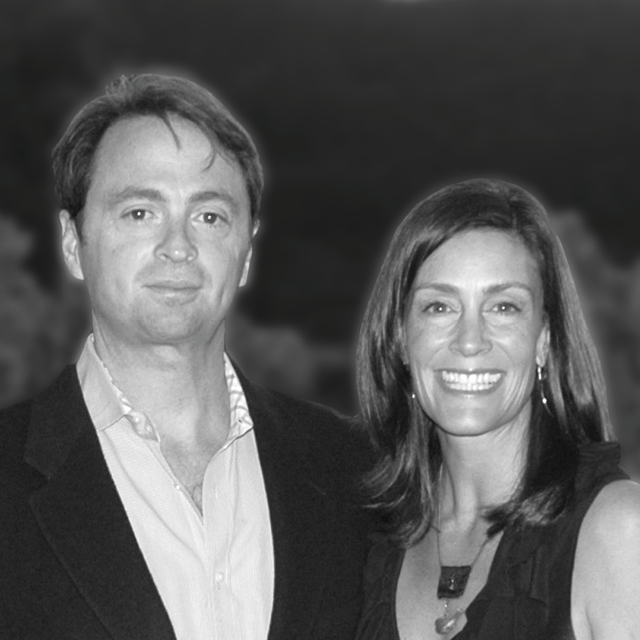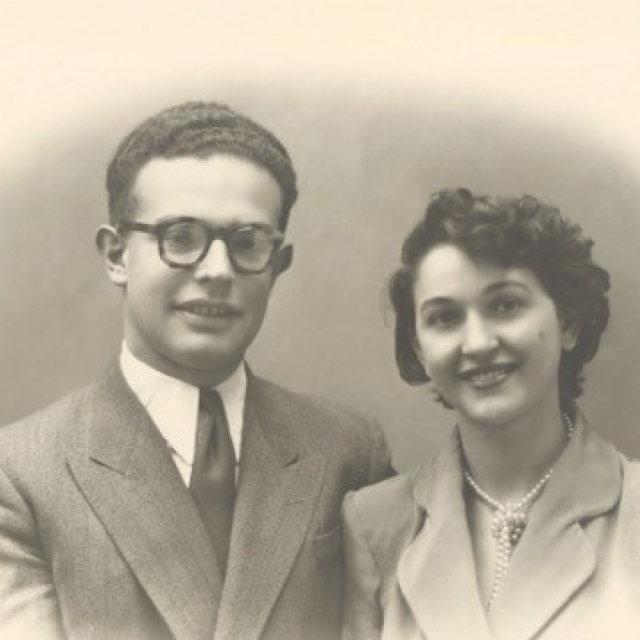Above: Marilyn and Christian Poindexter endowed a professorship in honor of their granddaughter, Catherine Poindexter. Here, Hugh Calkins, the inaugural Catherine Ellen Poindexter Professor, far left, stands with Marilyn and Christian next to a portrait of Catherine.
Christian Poindexter, former head of Constellation and BGE energy companies, passed out at the wheel while driving to a meeting in Baltimore in 1975. The sensation leading up to it felt familiar to the ex-naval aviator — like the G-force of a high-speed turn. He’d had a similar experience once in the Navy, when his heart began beating uncontrollably fast while piloting a single-seat jet attack aircraft off the USS Forrestal.
Neither the flight surgeons nor the many doctors he visited leading up to 1975 found anything wrong. But after losing consciousness, he went to the hospital, where he was finally diagnosed with Wolff-Parkinson-White syndrome. Poindexter immediately began to seek treatment.
Poindexter says while having a test, the doctor was on the phone trying to buy a car and “wasn’t paying any attention to me. So I decided, ‘I’m going to go to Johns Hopkins Hospital.’ I’ve been there ever since.”
Poindexter’s involvement with Johns Hopkins would eventually extend beyond the doctor’s office, when he was invited to join The Johns Hopkins Hospital board of trustees, having been an active member on many other local, statewide and national volunteer boards. He later joined the boards of Johns Hopkins Medicine and The Johns Hopkins University, but much of his commitment has remained with the Division of Cardiology and the people there who cared for him.
Cardiologist Hugh Calkins, M.D., first met Poindexter in 1993, a year after coming to Johns Hopkins as director of the Arrhythmia Service and the Electrophysiology Laboratory. At the time, Poindexter was under the care of Larry S. C. Griffith, one of the hospital’s early experts in heart arrhythmia, and was initially referred to Calkins for a catheter ablation procedure.
After Griffith’s retirement, Calkins became Poindexter’s primary cardiologist, and would go on to treat his two sons. It is a doctor-patient relationship with the family that has spanned 26 years.
Even when Poindexter and his wife, Marilyn, retired, they continued to direct support to Calkins and his research on atrial fibrillation, and they stayed involved with the Johns Hopkins cardiovascular advisory board. So, when the Poindexters decided to endow a professorship in memory of their granddaughter, Catherine Poindexter, Calkins was their first choice as its recipient.
“Chris is a very kind, generous man who has had several tough cardiac-related problems, but he continues to be extraordinarily active,” says Calkins. “I enjoy caring for patients like Chris.”
Funding from this professorship will support the time needed to conduct research and pursue additional teaching interests. But more importantly for Calkins, he says, receiving this professorship from the Poindexters is an immense source of inspiration.
“It’s an unbelievable honor to have a patient of 26 years form an opinion of you worthy of this kind of support,” says Calkins. “It’s the high point of my career and my time here at Hopkins.”


